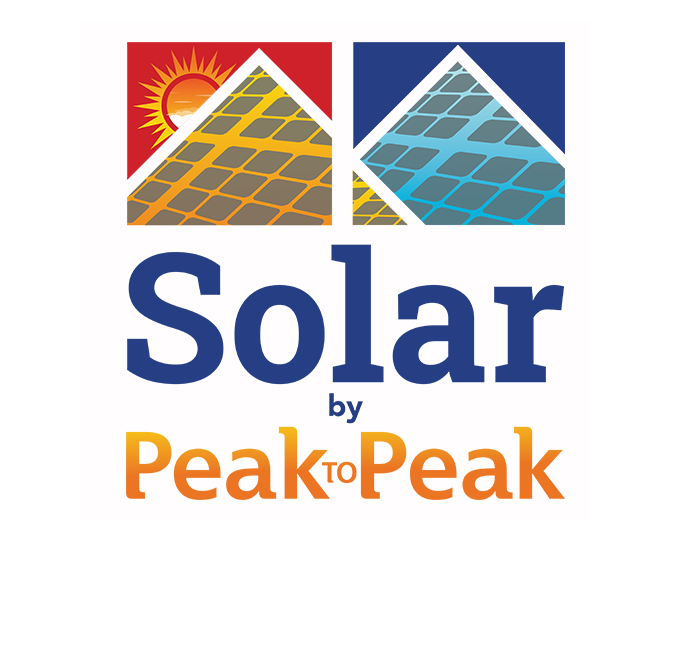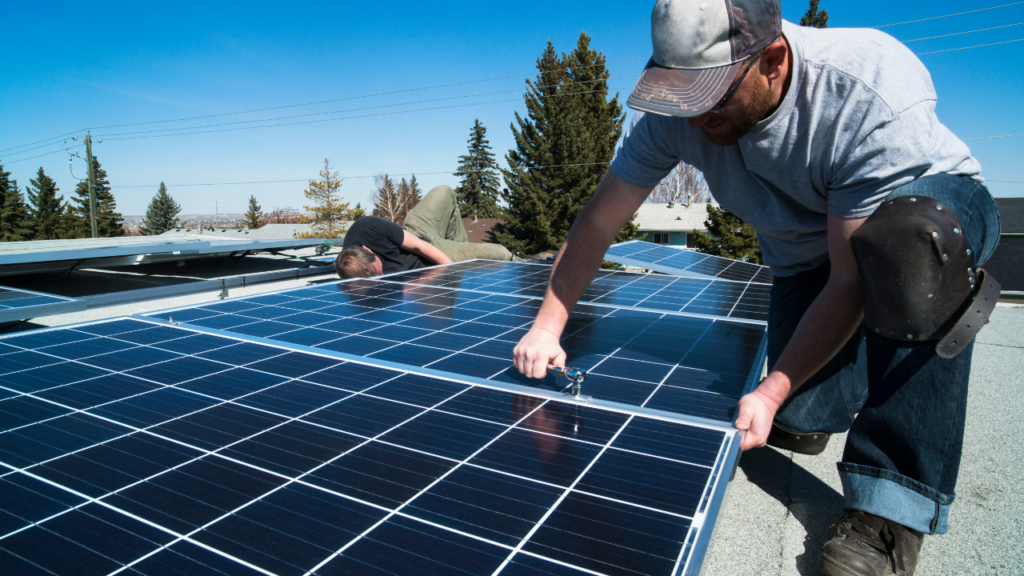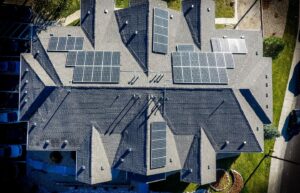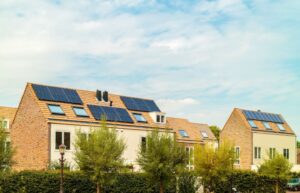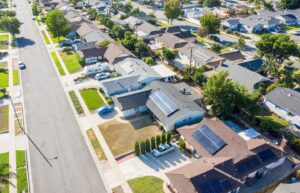Solar energy has gained significant attention as a renewable energy source that not only reduces our carbon footprint but also offers potential financial benefits, such as lower electricity prices and an opportunity to reduce your electric bill through net metering. By harnessing the power of the sun, you can take advantage of the favorable electricity rates and make a positive impact on both the environment and your wallet. But does going solar truly save money?
As solar panels generate electricity from sunlight, homeowners can rely less on traditional utility providers, reducing energy costs and savings on their monthly energy bills. Additionally, this renewable energy source helps to decrease overall energy use. Excess energy produced by solar systems can be fed back into the grid through net metering programs, allowing homeowners to earn credits or even receive payments for their surplus power. This can help reduce their electricity bill and take advantage of lower electricity prices.
Furthermore, solar panel systems offer significant energy savings over the years, as they reduce energy costs and minimize energy use. Additionally, these systems have long lifespans and require minimal maintenance. Once solar installations are installed, they can continue producing clean energy for decades without significant upkeep costs.
Ready to start saving with solar? Discover the financial benefits of going solar with Solar by Peak to Peak below.
Cost and Worthiness of Solar Panel Installation
Initial Investment Offset by Long-Term Savings on Electricity Bills
Installing solar panels can lead to significant long-term savings on your electricity bills. Over the years, the initial investment can be recouped in just a few months, thanks to the average savings generated. By harnessing the power of solar installations, you can generate your own clean energy with solar systems and reduce reliance on traditional energy sources.
Take advantage of solar incentives and consider a solar loan to make the switch. This means lower monthly utility bills, as you’ll be using less electricity from the grid with solar energy systems. Installing a solar power system can help reduce your average electricity consumption and save you money in the long run.
Pros:
- Lower monthly electricity bills
- Reduced dependence on traditional energy sources
Cons:
- Initial installation costs
- The potential savings from a solar power system can vary depending on factors such as the location of the solar system and the average energy usage per month.
Potential Increase in Property Value with Solar Panel Installation
One of the benefits of installing solar panels is that they can increase the average value of your property by a significant amount every month. As more homeowners become environmentally conscious and seek sustainable solutions, solar panel installations are seen as valuable additions to a property. These installations can save homeowners money on their monthly energy bills. This increased value can be beneficial if you decide to sell your home in the future, especially if you have an average solar power system or solar energy systems installed.
Pros:
- Increased property value
- Attraction for eco-conscious buyers
Cons:
- Market fluctuations may impact perceived value.
- Limited impact in areas with low demand for solar-powered homes is an average occurrence.
Various Financing Options are Available to Make Installation More Affordable
While the average upfront cost of solar panel installation may seem daunting, various financing options are available to make it more affordable for homeowners. These options include:
- Solar Loans: Many financial institutions offer loans specifically designed for solar installations, allowing homeowners to spread out the cost over time.
- Leasing or Power Purchase Agreements (PPAs): Instead of purchasing the solar panels outright, you can lease them or enter into a PPA where a third-party company installs and maintains the panels while you pay a fixed rate for the electricity generated.
- Incentives and Rebates: Depending on your location, such as Denver, Colorado, there may be state or local incentives and rebates available for installing a solar power system. These incentives and rebates can help offset the installation costs of solar energy.
- Federal Tax Credits: The federal government offers a solar investment tax credit (ITC) that allows homeowners to deduct a percentage of their solar panel installation costs from their federal taxes.
Average Savings from Solar Panels for Homeowners

Installing solar panels can lead to significant savings for homeowners over the lifetime of their system. While the exact amount saved will vary depending on factors such as location, energy usage, and system size, many homeowners can save thousands of dollars.
Homeowners can Save Thousands of Dollars Over the Lifetime of Their Solar Panels
One of the main benefits of installing solar panels is the potential for long-term cost savings. On average, homeowners who switch to solar can save between $10,000 and $30,000 over a 20-year period compared to relying solely on traditional grid electricity. These savings come from reduced monthly utility bills and various financial incentives for solar energy.
Savings Vary Depending on Factors such as Location, Energy Usage, and System Size
The amount that homeowners can save with solar power depends on several factors unique to each individual’s circumstances. Location plays a significant role in determining the potential savings.
For example, in Denver, Colorado, where there is an abundance of sunshine throughout the year, homeowners have a higher chance of maximizing their savings compared to areas with less sunlight.
Energy usage also affects how much money can be saved through solar panels. Homes that consume more electricity typically benefit more from installing a larger solar system because they generate more energy and offset a higher percentage of their utility bills.
The size and efficiency of the solar panel system itself are crucial factors in determining overall savings. A larger system will produce more electricity and provide greater financial benefits over time.
Net Metering Allows Homeowners to Earn Credits for Excess Energy Produced
One key advantage of going solar is net metering. This policy allows homeowners with solar panels to earn credits when they generate more electricity than they use. These credits can then be applied to future months when they may need additional power from the grid or during times when their panels are not producing enough energy.
Net metering effectively reduces or even eliminates monthly electricity bills for some homeowners. It provides an opportunity to not only save money but also contribute excess clean energy back to the grid, benefiting the environment.
Factors Influencing Savings with Solar Panels
Sunlight Availability and Intensity
One of the key factors that influence the savings potential of solar panels is the availability and intensity of sunlight. The quantity of sunlight that solar panels receive directly affects the amount of energy they produce. Regions with ample sunlight, such as Denver, Colorado, have a higher potential for generating electricity from solar panels compared to areas with less sunshine. So, if you’re considering installing solar panels in Denver, you can expect greater savings due to the abundance of sunlight in the region.
System Efficiency and Quality
The efficiency and quality of your solar panel system also play a crucial role in determining your overall savings. Higher-quality systems tend to be more efficient at converting sunlight into electricity, resulting in increased energy production and greater cost savings over time. When investing in solar panels, it’s important to choose reputable manufacturers and installers who offer reliable products and services. By opting for high-quality components and professional installation, you can maximize the performance of your system and enjoy greater long-term savings.
Government Policies and Incentives
Government policies and incentives can significantly impact the cost savings associated with solar panels. Many governments provide financial incentives or tax credits to encourage homeowners to adopt renewable energy sources like solar power. These incentives can help offset the initial installation costs or even provide ongoing benefits throughout the lifespan of your system.
In Denver, for example, various local programs offer rebates or grants for installing solar panels. By taking advantage of these government initiatives, you can further enhance your potential for saving money with solar energy.
Understanding Household Energy Usage and its Impact on Savings
Analyzing Current Energy Consumption Helps Determine the Appropriate System Size
To truly understand the potential savings that solar panels can bring, it’s essential to analyze your current household energy consumption. By examining your energy bills and usage patterns, you can determine the appropriate size of a solar panel system needed to meet your needs. This analysis ensures that you don’t overspend on a system that generates more electricity than you require or undersize it, resulting in inadequate energy production.
Energy-efficient Practices Further Enhance Savings with Solar Panels
In addition to installing solar panels, implementing energy-efficient practices within your home can significantly enhance your overall savings. Simple actions like switching to LED light bulbs, using smart power strips, and investing in energy-efficient appliances can reduce energy consumption. By reducing the amount of electricity you need from the grid, you maximize the benefits of solar power and save even more money.
Here are some key ways to improve energy efficiency:
- Upgrade to Energy Star-certified appliances: These appliances are designed to consume less electricity while maintaining optimal performance.
- Insulate your home properly: Adding insulation to walls, attics, and floors reduces heat loss during the winter months and keeps cool air inside during the summer months.
- Seal air leaks: Identifying and sealing any gaps or cracks around windows, doors, and vents prevents drafts and reduces the strain on heating or cooling systems.
- Use programmable thermostats: These devices allow you to set temperature schedules based on when you’re home or away, optimizing comfort while minimizing unnecessary heating or cooling.
By combining these energy-efficient practices with solar panels, homeowners can experience significant long-term savings on their utility bills.
Monitoring Tools Allow Homeowners to Track Their Energy Usage in Real-Time
To stay informed about their household’s energy consumption patterns and optimize their savings potential with solar panels, homeowners should consider utilizing monitoring tools. These tools provide real-time data on energy production and usage, allowing individuals to track their electricity generation and consumption daily or even hourly.
By monitoring their energy usage, homeowners can identify trends, make informed decisions about when to use certain appliances and adjust their behaviors accordingly. For example, suppose they notice a spike in energy consumption during peak hours when electricity prices are higher. In that case, they can shift the usage of energy-intensive appliances to off-peak hours. This proactive approach helps maximize savings by taking advantage of lower electricity rates.
Monitoring tools also provide insights into the performance of solar panels, ensuring that they’re operating at optimal efficiency. If any issues arise, such as a decrease in energy production due to dirt or shading on the panels, homeowners can address them promptly to maintain maximum savings.
State and Local Incentives for Solar Panels
Installing solar panels can be a significant investment, but did you know that it can also save you money in the long run? Many states across the country offer various incentives to encourage homeowners to go solar. These incentives can help offset the upfront costs and make solar energy more affordable for everyone.
Tax Credits and Rebates
One of the most common types of incentives offered by states is tax credits or rebates. These financial benefits can significantly reduce the overall cost of installing solar panels. For example, in Denver, Colorado, homeowners can take advantage of both federal and state tax credits. The federal Investment Tax Credit (ITC) allows eligible homeowners to claim a percentage of their solar installation costs as a credit on their federal taxes. Colorado offers its own state-level tax credit that further reduces the cost burden.
Cash Incentives and Grants
In addition to tax credits and rebates, some local utility companies provide cash incentives or grants to promote renewable energy adoption. These programs aim to encourage homeowners to switch to cleaner sources of electricity, like solar power. By offering financial rewards, utilities hope to increase the number of households generating their electricity from renewable sources.
Solar Renewable Energy Certificates (SRECs)
Another way homeowners can save money on solar panels is by selling Solar Renewable Energy Certificates (SRECs). SRECs are tradable certificates that represent the environmental attributes associated with one megawatt-hour (MWh) of electricity generated from renewable sources like solar power. Homeowners who produce excess energy through their solar panels can earn income by selling these certificates on a market platform.
Government Programs and Policies
Various government programs at both state and local levels aim to incentivize residential solar panel installations. These programs may include low-interest loans or financing options specifically designed for solar projects. Some states even offer property tax exemptions or reductions for homeowners who install solar panels. These incentives make going solar a more financially viable option for many households.
Location-Specific Incentives
It’s important to note that the availability and types of incentives can vary depending on your location. Each state has its own set of policies and programs in place to support renewable energy adoption. Local utility companies may also have their incentive programs tailored to the specific needs of their communities. Therefore, it’s crucial to research the incentives available in your area before making any decisions about installing solar panels.
Estimating Potential Savings and the Payback Period
Calculating the return on investment is a crucial step in determining whether installing solar panels will save you money in the long run. By estimating the potential savings and payback period, you can make an informed decision about the financial viability of going solar.
Calculating Return on Investment
To estimate potential savings, several factors need to be considered. These include the initial investment or upfront costs, maintenance costs, electricity rates, location, and available incentives. Online estimation tools have made this process much simpler by taking these factors into account and providing an estimate based on your specific circumstances.
Payback Period
The payback period refers to the time it takes for your initial investment in solar panels to be recouped through energy savings. It is typically measured in years and can range anywhere from 5 to 15 years, depending on various factors such as system cost, location, electricity rates, and incentives.
Calculating the payback period involves comparing your total cost of ownership (including installation costs) with the amount you save on your electricity bills each year. The longer the payback period, the longer it will take for you to start seeing significant savings.
Factors Affecting the Payback Period
- System Cost: The upfront cost of installing solar panels varies depending on factors like panel efficiency, the size of the system required for your energy needs, and any additional equipment needed for installation.
- Location: The amount of sunlight your area receives affects how much energy your solar panels can generate. For example, if you live in Denver, Colorado, where there are abundant sunny days throughout the year, you may experience higher energy production compared to other locations with less sunshine.
- Electricity Rates: Higher electricity rates mean greater potential savings when switching to solar power.
- Incentives: State and local incentives such as tax credits or rebates can significantly reduce your upfront costs and shorten the payback period.
- Maintenance Costs: While solar panels are generally low-maintenance, it’s important to factor in any potential costs for repairs or replacements over the lifespan of the system.
Estimation Tools
Online estimation tools have become invaluable resources for homeowners considering solar panel installation. These tools take into account your location, energy usage, and other relevant factors to provide an estimate of potential savings and payback periods. They can help you understand the financial implications of going solar and make a more informed decision.
Tips on Maximizing Savings with Solar Panels
Regular Maintenance Ensures Optimal Performance of the System
To truly maximize your savings with solar panels, it’s crucial to prioritize regular maintenance. Just like any other investment, solar panels require some TLC to ensure they continue operating at their best. By scheduling routine inspections and cleaning sessions, you can prevent any potential issues from arising and keep your system functioning optimally.
Regular maintenance includes:
- Cleaning: Over time, dust, dirt, and debris can accumulate on the surface of solar panels, reducing their efficiency. Cleaning them periodically helps maintain their performance levels.
- Inspections: Regular inspections by professionals can identify any signs of wear and tear or potential problems early on. This proactive approach allows for timely repairs and prevents more significant issues.
- Monitoring: Monitoring your system’s performance through monitoring software or tools can help you detect any abnormalities or drops in energy production. This way, you can address them promptly and avoid unnecessary losses.
By staying on top of maintenance tasks, you’ll ensure your solar panels consistently generate as much electricity as possible. This translates into increased savings over the long term.
Energy-Saving Habits Complement the Benefits of Solar Panels
While solar panels are a fantastic way to save money on energy costs, incorporating energy-saving habits into your daily life can further enhance those savings. By being mindful of how you consume electricity, you’ll be able to optimize the benefits provided by your solar panel system.
Here are some energy-saving habits to consider:
- Turn off lights: When leaving a room, make it a habit to turn off lights to avoid unnecessary energy consumption.
- Unplug unused electronics: Even when not in use, many electronic devices continue drawing power if they’re plugged in. Unplugging them when not needed saves both energy and money.
- Adjust thermostat settings: Utilize programmable thermostats to regulate the temperature in your home efficiently. Lowering the thermostat during colder months and raising it during warmer months can significantly reduce energy usage.
- Use natural lighting: Take advantage of natural light by opening curtains or blinds during the day, minimizing the need for artificial lighting.
By adopting these energy-saving habits, you’ll complement the benefits of solar panels and maximize your savings even further.
Consider Adding Battery Storage to Maximize Self-Consumption and Savings
Consider incorporating battery storage into your setup to take your solar panel system’s savings potential to the next level. Solar batteries allow you to store excess electricity generated by your panels during peak production periods for use later when sunlight is limited or unavailable.
Here are some advantages to adding battery storage:
- Maximized self-consumption: With a solar battery, you can store excess energy rather than sending it back to the grid. This means you can use more electricity you generate, reducing your reliance on utility companies and maximizing your savings.
- Backup power during outages: In case of a power outage, having a solar battery allows you to continue using stored electricity until regular power is restored. This provides peace of mind and ensures that essential appliances remain functional.
- Time-of-use optimization: Some utility companies offer time-of-use rates where electricity costs vary throughout the day. Utilizing a solar battery can strategically discharge stored energy during peak-rate hours, saving even more money.
Adding battery storage may involve additional upfront costs but can provide significant long-term financial benefits by maximizing self-consumption and overall savings with solar panels.
Does Solar Really Save Money?
So, does solar really save money? The answer is yes! Investing in solar panels can lead to significant long-term savings on your energy bills while reducing your carbon footprint.
By harnessing the sun’s power, you can generate clean and renewable energy for your home, which means you’ll rely less on traditional energy sources subject to price fluctuations. Not only will you see immediate savings on your electricity bill, but the return on investment (ROI) from solar panel installation can be substantial over time.Your entryway to a sun-powered, brighter future is Solar by Peak to Peak. We’re here to help you switch to solar energy and unlock a world of benefits. Take charge of your energy costs, reduce your environmental impact, and watch your savings grow. It’s time to rise above conventional energy sources and embrace the clean, renewable power of the sun. Don’t miss out on this opportunity to elevate your life—contact Solar by Peak to Peak today!
